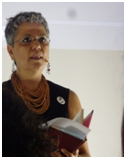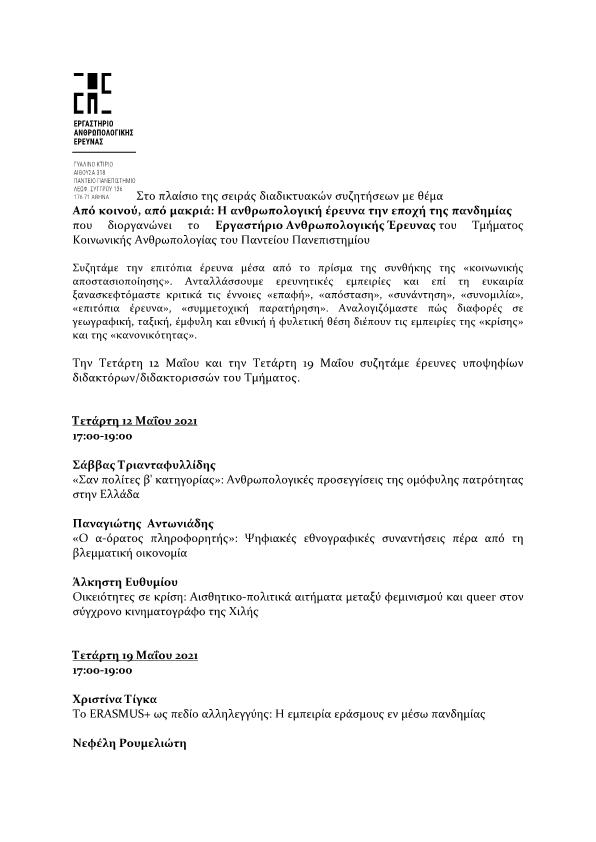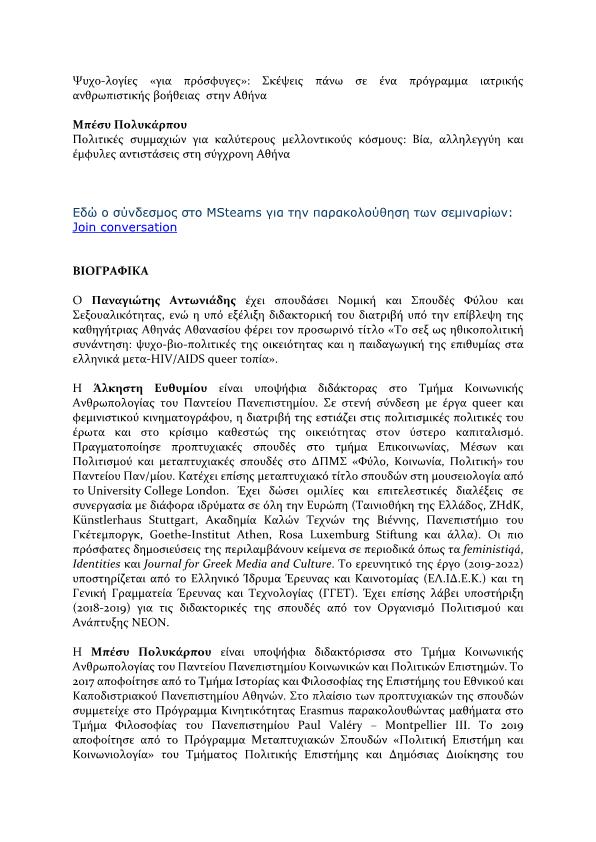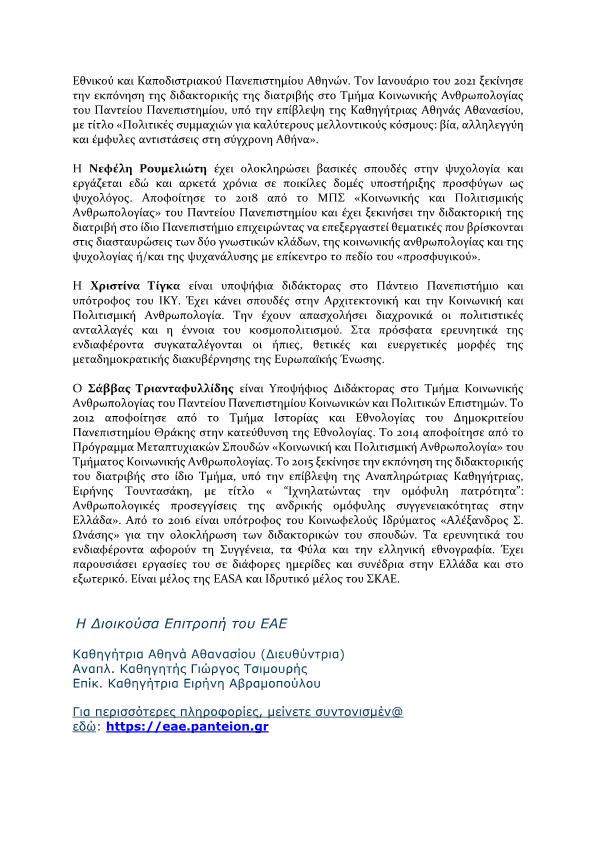Μήνας: Απρίλιος 2021
A’ Κύκλος Διαδικτυακών Εκπαιδευτικών Σεμιναρίων ΕΘΝΟΓΡΑΦΕΙΝ / Κριτικοί διάλογοι, επιστημολογικές προκλήσεις, εμπειρίες πεδίου, δημιουργικά κείμενα
Η Λέσχη Εθνογραφίας-Εργαστήριο Μελέτης του Πολιτισμού, των Συνόρων και του Κοινωνικού Φύλου,
διοργανώνει Κύκλο Εκπαιδευτικών Σεμιναρίων με τίτλο:
ΕΘΝΟΓΡΑΦΕΙΝ / Κριτικοί διάλογοι, επιστημολογικές προκλήσεις, εμπειρίες πεδίου, δημιουργικά κείμενα
Συντονισμός
Φωτεινή Τσιμπιρίδου – Ιωάννης Μάνος
«Οίκοι/ανήκει. Δεοντολογία, μεθοδολογία, επιστημολογία»
Ομιλήτρια: Νένη Πανουργιά
Αναπλ. Καθηγήτρια Ανθρωπολογίας,
Columbia University, Νέα Υόρκη
Παρασκευή 23/4/2021, 17:00-19:00
Πλατφόρμα Zoom: https://zoom.us/j/8954478253
Meeting ID: 895 447 8253
Μόνο όσοι/ες επιθυμούν βεβαίωση παρακολούθησης, μπορούν να εγγραφούν στην παρακάτω Google form: https://forms.gle/FgrPEBMCg5dLZQ3L6
Νένη Πανουργιά /Σύντομο βιογραφικό σημείωμα

Η Νένη Πανουργιά είναι ανθρωπολόγος, υπεύθυνη του Προγράμματος Justice in Education και Αναπληρώτρια Καθηγήτρια στο Τμήμα Εκπαίδευσης Φυλακών (Prison Education Program) στο Πανεπιστήμιο Columbia της Νέας Υόρκης. Διδάσκει εθελοντικά σε φυλακές στην Νέα Υόρκη.
Έχει διδάξει στα πανεπιστήμια Princeton, NYU, Rutgers, The New School for Social Research, και ως Επισκέπτρια στον βαθμό του Τακτικού Καθηγητή στο Πανεπιστήμιο των Παρισίων, Paris VIII, St. Denis. Εχει λάβει υποτροφίες γιά το ερευνητικό της έργο από το Κέντρο Ανωτάτων Μελετών για το Ολοκαύτωμα στην Washington, DC, το Κέντρο Ελληνικών Σπουδών του Πανεπιστημίου Princeton, το Ohio State University, και το Πανεπιστήμιο Columbia, μεταξύ άλλων. Είναι μέλος της Ακαδημίας Επιστημών της Νέας Υόρκης και Συντάκτρια του περιοδικού Anthropology and Humanism.
Το πρώτο της βιβλίο Fragments of Death, Fables of Identity. An Athenian Anthropography έλαβε το Μέγιστο Βραβείο της Κριτικής Επιτροπής της Διεθνούς Εταιρείας Εθνοϊστορίας (1996) και το Βραβείο Λαογραφίας του Chicago (1997). Ο συλλογικός τομος που επιμελήθηκε με τον George Marcus Ethnographica Moralia. Experiments in Interpretive Anthropology κυκλοφόρησε από το Fordham University Press το 2008. Το βιβλίο της Dangerous Citizens. The Greek Left and the Terror of the State κυκλοφορεί από τις Πανεπιστημιακές Εκδόσεις Fordham (2009, και www.dangerouscitizens.columbia.edu) και στα ελληνικά από τις εκδόσεις Καστανιώτη (Επικίνδυνοι Πολίτες. Η ελληνική αριστερά και η κρατική τρομοκρατία, 2013) και έχει αποσπάσει τα βραβεία PROSE (2010), Victor Turner Prize in Ethnographic Writing (American Anthropological Association, 2011) και Edmund Keeley Prize (Modern Greek Studies Association, 2011).
Το
πιο πρόσφατο βιβλίο της, Λέρος. Η γραμματική του εγκλεισμού που κυκλοφόρησε από
τις εκδόσεις Νεφέλη το 2020, είναι ένα εκδοτικό πείραμα που περιλαμβάνει
πολλαπλά μέσα επικοινωνίας με τον αναγνώστη και πραγματεύεται την κατάσταση
εγκλεισμού ως βασική υποδομή του κράτους. Άρθρα της για την εθνογραφική θεωρία,
την νεοκλασική αρχιτεκτονική στην Ελλάδα, την βιοπολιτική και το σώμα, την
εννοιολόγηση της ζωής και του θανάτου σε νοσοκομεία αλλά και στα στρατόπεδα
πειθαρχημένης διαβίωσης, για τον ρατσιστικό λόγο στην Ελλάδα, και για την
κρατική βία, καθώς και συνεντεύξεις της με κορυφαίους ανθρωπολόγους έχουν
δημοσιευθεί σε διάφορα επιστημονικά περιοδικά και εφημερίδες, όπως angelaki, re-public, Public Culture,
Anthropology and Humanism, Anthropological Theory, Τα Νέα, Ο Πολίτης, Τετράδια
Ψυχιατρικής, και άλλα. Ζεί στην Νέα Υόρκη και την Αθήνα. Η καινούργια της
έρευνα «COVID-19 και η κατάσταση εγκλεισμού» χρηματοδοτείται από το Mellon
Foundation και διεξάγεται συλλογικά με πρώην φυλακισμένους στις φυλακές της
Νέας Υόρκης.
Λέσχη Εθνογραφίας-Εργαστήριο Μελέτης του Πολιτισμού, των Συνόρων και του Κοινωνικού Φύλου
1ος Κύκλος Εκπαιδευτικών Σεμιναρίων
ΕΘΝΟΓΡΑΦΕΙΝ/Κριτικοί διάλογοι, επιστημολογικές προκλήσεις, εμπειρίες πεδίου, δημιουργικά κείμενα.
Με αφετηρία τον προσωπικό και ενσώματο τρόπο βίωσης της εθνογραφικής έρευνας, την ανάγκη για αναστοχασμό και την αναζήτηση για μία αποτελεσματική αφήγηση, που μπορεί να ακολουθεί τους συμβατικούς τρόπους ανθρωπολογικής γραφής, ή να βασίζεται σε μία πειραματική μορφή, ως μία «εθνογραφία με άλλο δημιουργικό τρόπο», το σεμινάριο διερευνά πτυχές και εμπειρίες της εθνογραφικής πρακτικής και της σύνθεσης του εθνογραφικού κειμένου, ή άλλου οπτικοακουστικού τρόπου, με τον οποίο παρουσιάζονται τα αποτελέσματα της έρευνας.
Μας απασχολούν ζητήματα όπως:
- οι τρόποι, με τους οποίους διαμορφώνονται η εθνογραφική γνώση και η ανθρωπολογική θεωρία μέσα από τις εμπειρίες της συνάντησης με και (σ)το πεδίο
- οι προκλήσεις, οι συγκρούσεις και οι ηθικοί προβληματισμοί, σε προσωπικό και επαγγελματικό επίπεδο, σχετικά με το πεδίο, αλλά και σε σχέση με το θεωρητικό πλαίσιο αναφοράς, την ιστορική συγκυρία, την κοινωνική και πολιτική συνθήκη
- οι μνήμες και οι ενσώματες πτυχές της έρευνας, οι οποίες μπορούν να εισαχθούν ως εθνογραφικά δεδομένα στους τρόπους αφήγησης και να συμβάλουν στο μετασχηματισμό της αυστηρής επιστημονικής μελέτης σε απολαυστική αυτοβιογραφική διήγηση
- πώς προχωρά η σχέση του/της ερευνητή/τριας με τους ανθρώπους που μελέτησε, όταν τελειώνει η έρευνα;
- για ποιους γράφουμε, τελικά, τις εθνογραφίες μας και ποιοι/ες θέλουμε να μας διαβάζουν;
Στόχος του σεμιναρίου είναι να συμβάλει σε μία κριτική και διεπιστημονική συζήτηση για τη θεωρία και πρακτική της εθνογραφίας, την επιστημολογία της έρευνας, τη σημασία της ενσώματης εμπειρίας, αλλά και τους τρόπους διάχυσης της παραγόμενης ανθρωπολογικής γνώσης στο ακαδημαϊκό και μη-ακαδημαϊκό κοινό. Η ανθρωπολογική μελέτη, ως ερευνητική πρακτική και ως πολιτική γραφής που εμπεριέχει την κριτική αποτίμηση, την ενσυναίσθηση, τον αναστοχασμό και την αυτοαναφορικότητα, αναδεικνύει τη σημασία της πολυτροπικής ανάλυσης του τοπικού για την κατανόηση του γενικού.
Ομιλίες 1ου κύκλου του ΕΘΝΟΓΡΑΦΕΙΝ:
Νάντια Σερεμετάκη,
Καθηγήτρια Ανθρωπολογίας, 2 Απριλίου 2021, (17:00-19:00)
Νένη Πανουργιά,
Καθηγήτρια Ανθρωπολογίας (Columbia University), 23 Απριλίου 2021, (17:00-19:00)
Δημήτρης Δαλάκογλου,
Καθηγητής Ανθρωπολογίας, Vrije University Amsterdam),14 Μαΐου 2021, (17:00-19:00)
«Decolonize Hellas/Decolonize the Balkans and Eastern Europe: a first contact»

Webinar/workshop (19.5. 2021, 5-8 pm) University of Macedonia
Convenors: FotiniTsibiridou, Eleni Sideri, Ioannis Manos
Link https://zoom.us/j/8954478253
Meeting ID: 895 447 8253
Decolonize Hellas https://decolonizehellas.org/, Culture, Borders, Gender/LAB https://cbg-lab.uom.gr/en/, MA History, Anthropology and Culture in Eastern and South Eastern Europe https://www.uom.gr/en/mahac, CREABALK network https://cbg-lab.uom.gr/en/blog/networks/creabalk/
Program/Participants:
1. «Decolonize Hellas/Decolonize the Balkans and Eastern Europe: a first contact», Introductory remarks, by FotiniTsibiridou
2.“Frameworks of race and decolonisation: bridging post-Yugoslav spaces and Hellas”?, podcast by Catherine Baker
3.“Decolonial theory and practices in Eastern and South Eastern Europe”, SpecialIssuepresentation by Polina Manolova (on behalf of Katarina Kušić, Philipp Lottholz),
4.“The Return of the Colonial: Understanding the Role of Eastern Europe in Global Colonisation Debates and Decolonial Struggles”, Workshop presentation by Zoltán Ginelli (on behalf of Romina Istratii, Márton Demeter)
5.“Doing epistemic decolonization in Bosnia: peripheral selves”, reflections by Daniela Majstorovic
6.“Thessaloniki and Other Balkan Cities: Monuments, Memory, Representation, Affective Biographies, Cultural Geographies and Everyday Sensory Anthropology”, on the CREABALK network activities by Eleni Sideri (Pierre Sintès, Alessandro Galliccio, Olivier Givre, Fotini Tsibiridou)
Coordination of the panel/discussion: Ioannis Manos
Bios:
Catherine Baker is Senior Lecturer in 20th Century History(University of Hall). She is a specialist in post-Cold War history, international relations and cultural studies, including the post-Yugoslav region in a transnational and global context.Her research projects are connected by an overarching interest in the politics of representing, narrating and knowing about the past. Catherine’s current projects include relationships between war / the military and popular culture; the cultural politics of international events (including the Eurovision Song Contest); LGBTQ politics and identities since the late Cold War, including queer representation in media; and ‘race’ in the Yugoslav region. She has also researched interpreters / translators in peacekeeping.
Contact: Catherine.Baker@hull.ac.uk
Alessandro Gallicchio is Professor of contemporary art history at École supérieure des beaux-arts de Nîmes and adjunct faculty member at TELEMMe (AMU-CNRS) in Aix-en-Provence/Marseille. After he completed his PhD, he was a post-doctoral fellow at the Institut National d’Histoire de l’Art and Centre Pompidou (Labex CAP) and worked on the relations between art and urban space in contemporary Albania. Through an interdisciplinary approach, engaging a dialogue between art history, cultural geography, architectural history, and anthropology, he launched with Pierre Sintès MonuMed, an art and social sciences project focused on the new practices of artistic and architectural monumentalization. In 2020 he was André Chastel fellow at the Villa Medici in Rome and in 2021 he is researcher in residence at École Françaised’Athènes. As an independent curator, he collaborates with international art centers and museums and he presented Rue d’Alger exhibition in Manifesta 13 Marseille Les Parallèles du Sud Biennial.
Contact: alessandro.gallicchio@gmail.com
Zoltán Ginelliis a PhD Candidate in Geography at EötvösLoránd University. His research and teaching focuses on critical geography, historical and political geography, and the geographies of knowledge, but he also specializes in the history, sociology and philosophy of science, science communication, and science and technology studies. His forthcoming dissertation book is a transnational history of the “quantitative revolution” in Cold War geography, and his current research reinterprets colonial history and postcolonialist thought in Eastern Europe. Since 2015, he has been a part-time Research Assistant in the international research projects “1989 After 1989” and “Socialism Goes Global” at the University of Exeter. Zoltán is devoted to fighting social injustice, promoting progressive teaching and critical geography in Hungary, for which he runs two blogs, the Forum for Hungarian Critical Geographers (https://www.facebook.com/kritikaifoldrajz) and Critical Geographies (https://kritikaifoldrajz.hu). Whenever he can, Zoltán enjoys academic reading, blog writing, traveling, and art, while on gloomy evenings plays the blues on his prized guitar, an American Fender Stratocaster.
Contact: zginelli@gmail.com
Olivier Givre, is anthropologist and Associate Professor at the University Lumière-Lyon2 (France). He works mainly in the Balkans (Bulgaria, Greece and other countries) on several fields: ritual and religious dynamics, memoryand heritage processes, border and territory issues. His present research interests concern ecological anthropology, sensory anthropology and research-creation. He is the cofounder of the CREABALK – Creative Balkans network. https://univ-lyon2.academia.edu/OlivierGivre
Contact: olivier.givre1@univ-lyon2.fr
Danijela Majstorović (MA 2003, Ohio University; PhD 2006 University of Banja Luka) is a Professor of English Linguistics and Cultural Studies at the University of Banja Luka’s English department. She is also a Humboldt Experienced Research Fellow studying social protests and third-wave migrations in and from post-2015 Western Balkans at Justus Liebig University in Giessen, Germany. She was a visiting researcher at Lancaster University in 2006, a Fulbright fellow at UCLA in 2012-2013, a Canada Research Chair in Cultural Studies Postdoctoral Fellow at the University of Alberta in 2014 and a visiting researcher at Indiana University in 2016. Her research interests involve critical discourse analysis, critical theory, feminist theory, post- and decolonial theory, and post-Dayton Bosnia. She published over 25 journal articles, co-authored Youth Ethnic and National Identity in Bosnia and Herzegovina (Palgrave, 2013), authored Diskursiperiferije (Biblioteka XX vek, Belgrade) and Diskurs, moć i međunarodnazajednica (FF Banja Luka, 2007). She edited Living With Patriarchy: Discursive Construction of Gendered Subjects Across Cultures (John Benjamins, 2011), U okriljunacije (CKSP Banja Luka, 2011) and Kritičkekulturološkestudije u postjugoslovenskomprostoru (Banja Luka, 2012). Her new book Discourse and Affect in Post-socialist Bosnia and Herzegovina: Peripheral Selves is due to come for Palgrave in 2021.
Contact: kulturoloskestudije@gmail.com
Polina Manolova holds a PhD in East European Studies from the University of Birmingham, UK. She teaches under- and postgraduate courses in migration, borders and power asymmetries across Europe. Her research focuses on intra-EU migrations and pathways of incorporation of east European migrants in Germany. Furthermore, she is interested in exploring the spread of Western modernity and (self) Orientalisation narratives in postsocialist Europe. She is a member and co-founder of the Dialoguing Posts Network. Currently, she is based in the University of Tuebingen (Germany).
Contact: polinamanolova@gmail.com
Ioannis Manos is Αssociate Professor in the Department of Balkan, Slavic and Oriental Studies, at the University of Macedonia in Thessaloniki. He studied History and Archaeology at the Aristotle University of Thessaloniki and Social Anthropology at the Universities of Hamburg, Germany and Sussex in the UK. He worked as a Full Time Visiting Research Fellow at the Sussex European Institute, (Sussex University) holding a Marie Curie scholarship from the European Union. He is a member of the editorial collective of the Teaching Anthropology Journal (Royal Anthropological Institute) and co-convener of the EASA-Teaching Anthropology Network. He is a founding member of the academic network for Anthropology and the Balkans «Border Crossings», member of the Advisory Board and co-editor of its publication series. His main research interests focus on Southeast Europe and his publications include articles and co-edited volumes on geopolitical borders and border regions, nationalism and identity politics, anthropology of dance, migration and the methodology of teaching anthropology.
Contact address: imanos@uom.edu.gr
Eleni Sideri, holds a PhD in social anthropology from SOAS/University of London. She completed three master degrees in Social Anthropology, Near and Middle Eastern studies (SOAS) and sociolinguistics (AUTH). She holds also a degree in Film Studies (AUTH). She did fieldwork in the Caucasus, in Bosnia-Herzegovina and in Greece. Her academic interests include diasporas, transnational migrations, mobilities, tourism and post-conflict urban development, language and sociolinguistics, post-socialist societies and cinemas, film and TV narratives, anthropology of media, experimental ethnographic writing, digital technologies. She co-edited the volume Religions and Migrations in the Black Sea (2017) Macmillan/Palgrave.
Contact: elasideri@uom.edu.gr
Pierre Sintès is Associate Professor of Cultural and Social Geography at Aix- Marseille University, France. His research is about the social and political transformations related to migration, diaspora and mobility in Greece and other Balkan’s countries. He focuses more particularly on discourses of identification, and social and ethnic affiliations and relationships between identity and space. His recent publications (in English) include Chasing the Past: Geopolitics of Memory on the Margins of Modern Greece (Liverpool University Press, 2020), Social Practices and Local Configurations in the Balkans (European University of Tirana Press, 2013) and Borders, Mobilities and Migrations. Perspectives from the Mediterranean, 19–21st Century (Peter Lang, 2011).He is the cofounder of the CREABALK – Creative Balkans network.
Contact: Pierre.sintes@univ-amu.fr
Fotini Tsibiridou is Professor of Social Anthropology at the Department of Balkan, Slavic and Oriental Studies at the University of Macedonia and acting Director of the Laboratory for the Study of Culture, Borders and Gender. She has done fieldwork in a former refugee village and among the Pomaks in Greek Thrace, in Macedonian and Peloponnese villages and the Sultanate of Oman. She has also researched nationalism and multiculturalist discourses and practices in Greek Thrace, as well as gender, citizenship and creative counter publics in Istanbul. Currently (since 2018) she is researching two topics: post-Ottoman religiosity and gendered subjectivity in the frame of post-colonial critique (Balkans, Turkey, the Middle East), and feminist and other decolonizing methodologies deployed in creative protests and resistance practices in Mediterranean cities in the way to/of cosmopolitics. She is the cofounder of the CREABALK – Creative Balkans network.
Contact: ft@uom.edu.gr
Εκπαιδευτικό Σεμινάριο με θέμα: «Ψηφιακές τεχνολογίες και έρευνα στις κοινωνικές και ανθρωπιστικές επιστήμες»
Παρασκευή 9/4/2021 17:00-20:00
Πλατφόρμα Zoom: https://zoom.us/my/bsas9 (για να συνδεθείτε εύκολα, κάνετε copy paste το παρόν link στον browser που χρησιμοποιείτε)
Στους/στις συμμετέχοντες/ουσες που θα κάνουν εγγραφή στην παρακάτω φόρμα (έως 8/4 στις 12:00 μ.), θα δοθούν βεβαιώσεις παρακολούθησης: https://forms.gle/QwddFUMeHXmdANhC8



